Business Law Assignment: Contractual Relationships and Considerations
VerifiedAdded on 2021/04/17
|7
|1288
|66
Homework Assignment
AI Summary
This business law assignment analyzes several contractual relationships based on provided scenarios, focusing on the principles of consideration and promissory estoppel. The assignment examines the cases of John and Nick, the police and Nick, Hanson and Nick, and Ian and Nick, applying legal precedents like Harris v Watson, Collins v Godefroy, Eastwood v Kenyon, and D & C Builders v Rees to determine the enforceability of agreements and the presence of valid consideration. The analysis considers existing contractual duties, past consideration, and the application of promissory estoppel in situations where formal contracts may be absent. The conclusion summarizes the outcomes of each scenario, clarifying the legal obligations and potential liabilities based on the provided facts and legal principles.
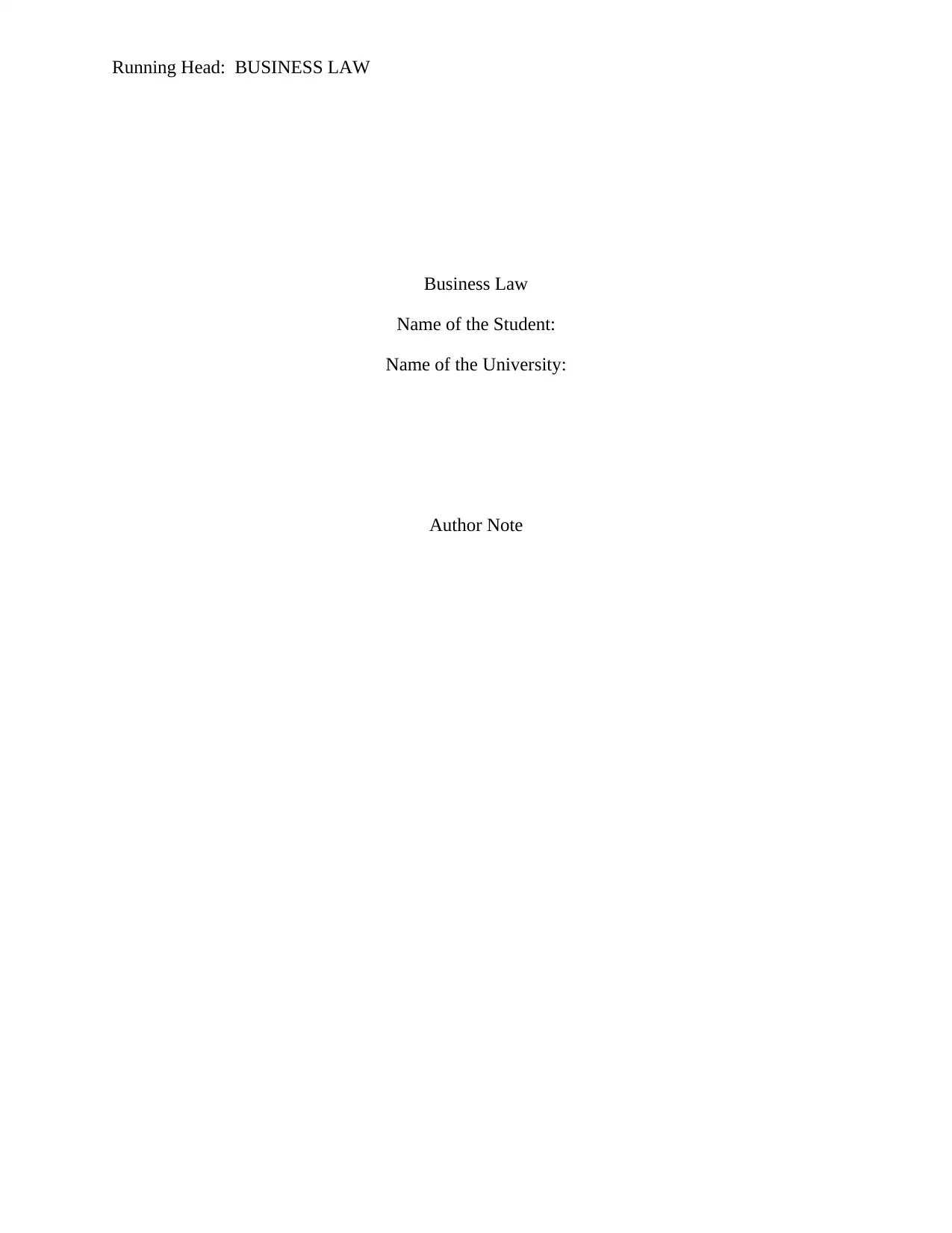
Running Head: BUSINESS LAW
Business Law
Name of the Student:
Name of the University:
Author Note
Business Law
Name of the Student:
Name of the University:
Author Note
Paraphrase This Document
Need a fresh take? Get an instant paraphrase of this document with our AI Paraphraser
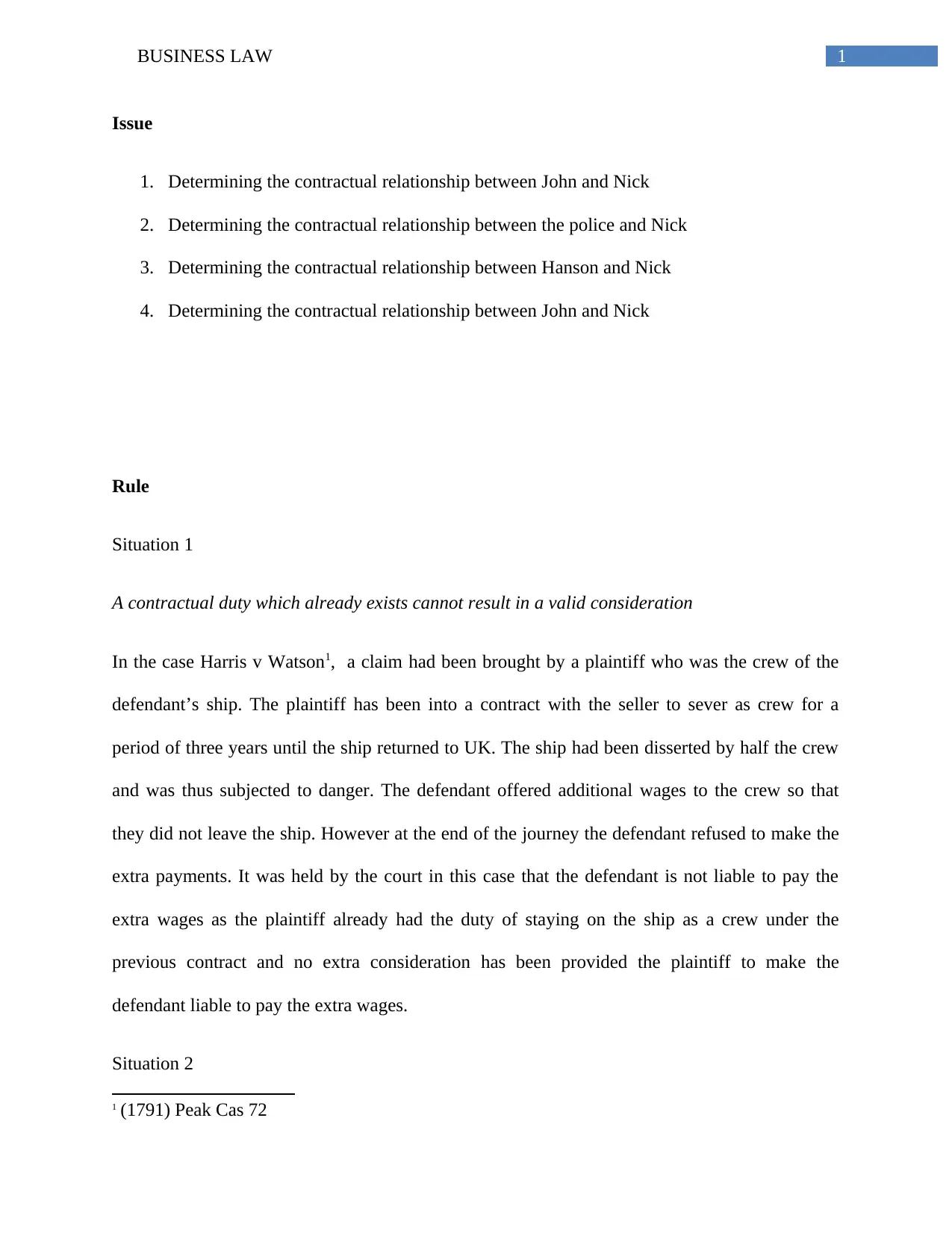
1BUSINESS LAW
Issue
1. Determining the contractual relationship between John and Nick
2. Determining the contractual relationship between the police and Nick
3. Determining the contractual relationship between Hanson and Nick
4. Determining the contractual relationship between John and Nick
Rule
Situation 1
A contractual duty which already exists cannot result in a valid consideration
In the case Harris v Watson1, a claim had been brought by a plaintiff who was the crew of the
defendant’s ship. The plaintiff has been into a contract with the seller to sever as crew for a
period of three years until the ship returned to UK. The ship had been disserted by half the crew
and was thus subjected to danger. The defendant offered additional wages to the crew so that
they did not leave the ship. However at the end of the journey the defendant refused to make the
extra payments. It was held by the court in this case that the defendant is not liable to pay the
extra wages as the plaintiff already had the duty of staying on the ship as a crew under the
previous contract and no extra consideration has been provided the plaintiff to make the
defendant liable to pay the extra wages.
Situation 2
1 (1791) Peak Cas 72
Issue
1. Determining the contractual relationship between John and Nick
2. Determining the contractual relationship between the police and Nick
3. Determining the contractual relationship between Hanson and Nick
4. Determining the contractual relationship between John and Nick
Rule
Situation 1
A contractual duty which already exists cannot result in a valid consideration
In the case Harris v Watson1, a claim had been brought by a plaintiff who was the crew of the
defendant’s ship. The plaintiff has been into a contract with the seller to sever as crew for a
period of three years until the ship returned to UK. The ship had been disserted by half the crew
and was thus subjected to danger. The defendant offered additional wages to the crew so that
they did not leave the ship. However at the end of the journey the defendant refused to make the
extra payments. It was held by the court in this case that the defendant is not liable to pay the
extra wages as the plaintiff already had the duty of staying on the ship as a crew under the
previous contract and no extra consideration has been provided the plaintiff to make the
defendant liable to pay the extra wages.
Situation 2
1 (1791) Peak Cas 72
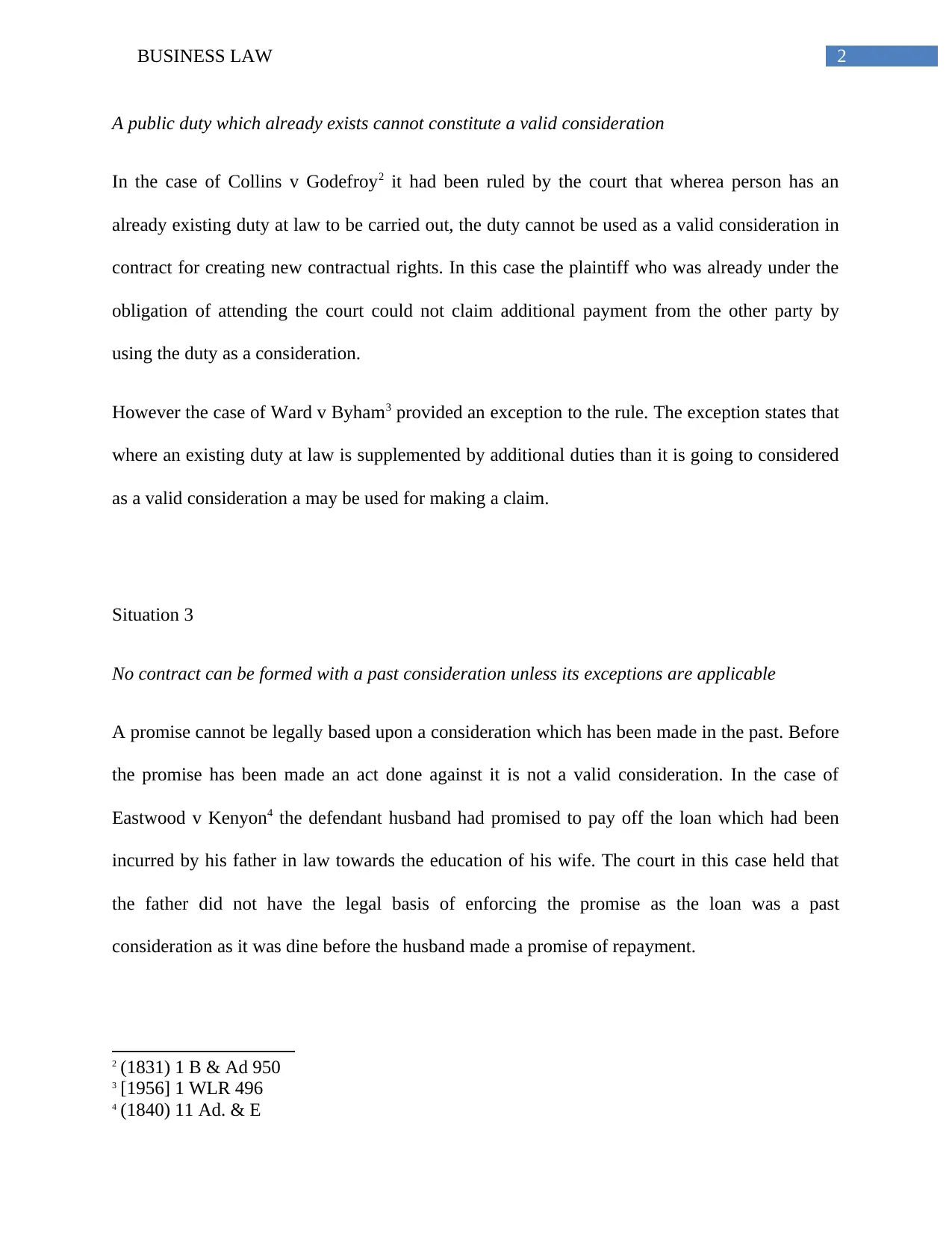
2BUSINESS LAW
A public duty which already exists cannot constitute a valid consideration
In the case of Collins v Godefroy2 it had been ruled by the court that wherea person has an
already existing duty at law to be carried out, the duty cannot be used as a valid consideration in
contract for creating new contractual rights. In this case the plaintiff who was already under the
obligation of attending the court could not claim additional payment from the other party by
using the duty as a consideration.
However the case of Ward v Byham3 provided an exception to the rule. The exception states that
where an existing duty at law is supplemented by additional duties than it is going to considered
as a valid consideration a may be used for making a claim.
Situation 3
No contract can be formed with a past consideration unless its exceptions are applicable
A promise cannot be legally based upon a consideration which has been made in the past. Before
the promise has been made an act done against it is not a valid consideration. In the case of
Eastwood v Kenyon4 the defendant husband had promised to pay off the loan which had been
incurred by his father in law towards the education of his wife. The court in this case held that
the father did not have the legal basis of enforcing the promise as the loan was a past
consideration as it was dine before the husband made a promise of repayment.
2 (1831) 1 B & Ad 950
3 [1956] 1 WLR 496
4 (1840) 11 Ad. & E
A public duty which already exists cannot constitute a valid consideration
In the case of Collins v Godefroy2 it had been ruled by the court that wherea person has an
already existing duty at law to be carried out, the duty cannot be used as a valid consideration in
contract for creating new contractual rights. In this case the plaintiff who was already under the
obligation of attending the court could not claim additional payment from the other party by
using the duty as a consideration.
However the case of Ward v Byham3 provided an exception to the rule. The exception states that
where an existing duty at law is supplemented by additional duties than it is going to considered
as a valid consideration a may be used for making a claim.
Situation 3
No contract can be formed with a past consideration unless its exceptions are applicable
A promise cannot be legally based upon a consideration which has been made in the past. Before
the promise has been made an act done against it is not a valid consideration. In the case of
Eastwood v Kenyon4 the defendant husband had promised to pay off the loan which had been
incurred by his father in law towards the education of his wife. The court in this case held that
the father did not have the legal basis of enforcing the promise as the loan was a past
consideration as it was dine before the husband made a promise of repayment.
2 (1831) 1 B & Ad 950
3 [1956] 1 WLR 496
4 (1840) 11 Ad. & E
⊘ This is a preview!⊘
Do you want full access?
Subscribe today to unlock all pages.

Trusted by 1+ million students worldwide
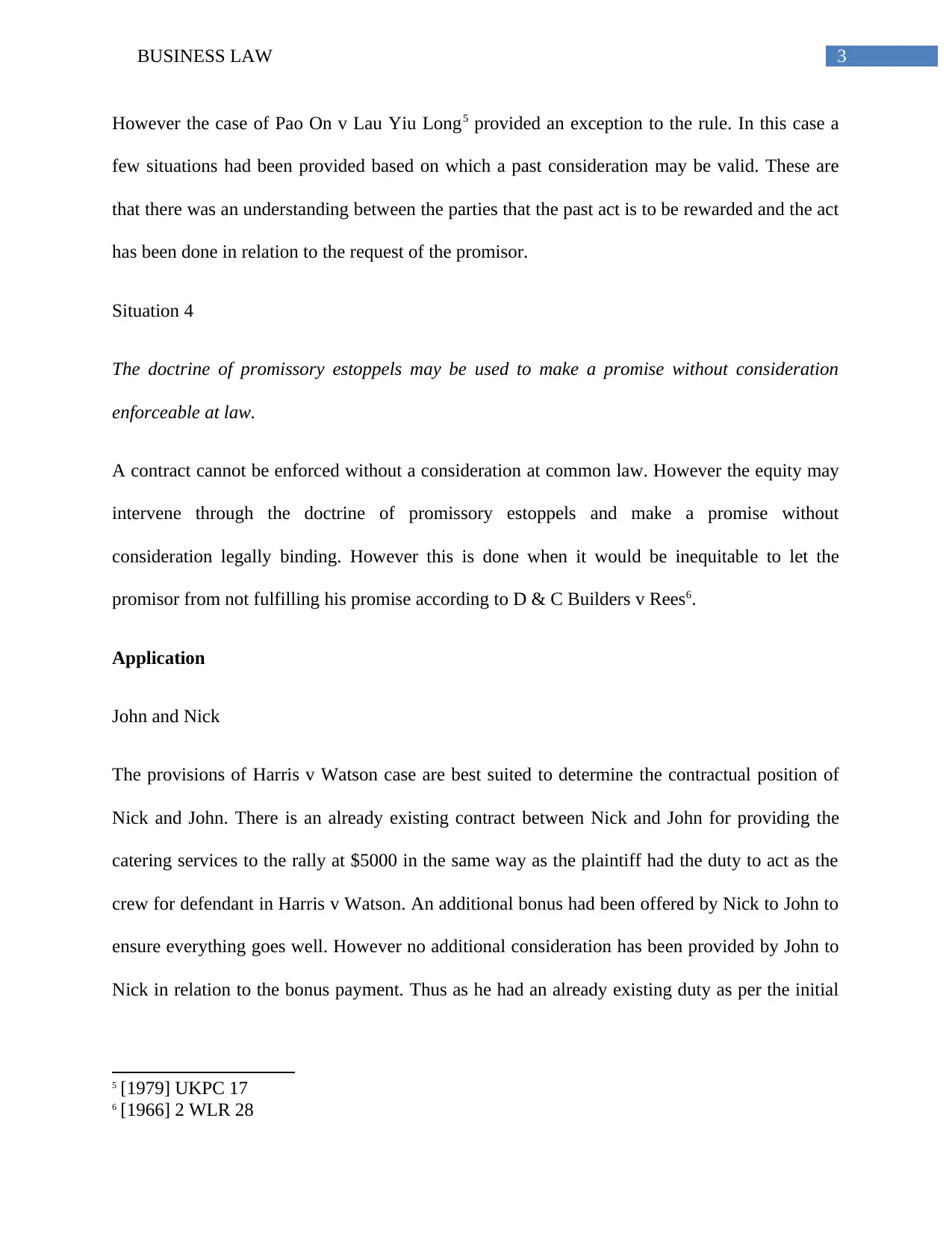
3BUSINESS LAW
However the case of Pao On v Lau Yiu Long5 provided an exception to the rule. In this case a
few situations had been provided based on which a past consideration may be valid. These are
that there was an understanding between the parties that the past act is to be rewarded and the act
has been done in relation to the request of the promisor.
Situation 4
The doctrine of promissory estoppels may be used to make a promise without consideration
enforceable at law.
A contract cannot be enforced without a consideration at common law. However the equity may
intervene through the doctrine of promissory estoppels and make a promise without
consideration legally binding. However this is done when it would be inequitable to let the
promisor from not fulfilling his promise according to D & C Builders v Rees6.
Application
John and Nick
The provisions of Harris v Watson case are best suited to determine the contractual position of
Nick and John. There is an already existing contract between Nick and John for providing the
catering services to the rally at $5000 in the same way as the plaintiff had the duty to act as the
crew for defendant in Harris v Watson. An additional bonus had been offered by Nick to John to
ensure everything goes well. However no additional consideration has been provided by John to
Nick in relation to the bonus payment. Thus as he had an already existing duty as per the initial
5 [1979] UKPC 17
6 [1966] 2 WLR 28
However the case of Pao On v Lau Yiu Long5 provided an exception to the rule. In this case a
few situations had been provided based on which a past consideration may be valid. These are
that there was an understanding between the parties that the past act is to be rewarded and the act
has been done in relation to the request of the promisor.
Situation 4
The doctrine of promissory estoppels may be used to make a promise without consideration
enforceable at law.
A contract cannot be enforced without a consideration at common law. However the equity may
intervene through the doctrine of promissory estoppels and make a promise without
consideration legally binding. However this is done when it would be inequitable to let the
promisor from not fulfilling his promise according to D & C Builders v Rees6.
Application
John and Nick
The provisions of Harris v Watson case are best suited to determine the contractual position of
Nick and John. There is an already existing contract between Nick and John for providing the
catering services to the rally at $5000 in the same way as the plaintiff had the duty to act as the
crew for defendant in Harris v Watson. An additional bonus had been offered by Nick to John to
ensure everything goes well. However no additional consideration has been provided by John to
Nick in relation to the bonus payment. Thus as he had an already existing duty as per the initial
5 [1979] UKPC 17
6 [1966] 2 WLR 28
Paraphrase This Document
Need a fresh take? Get an instant paraphrase of this document with our AI Paraphraser
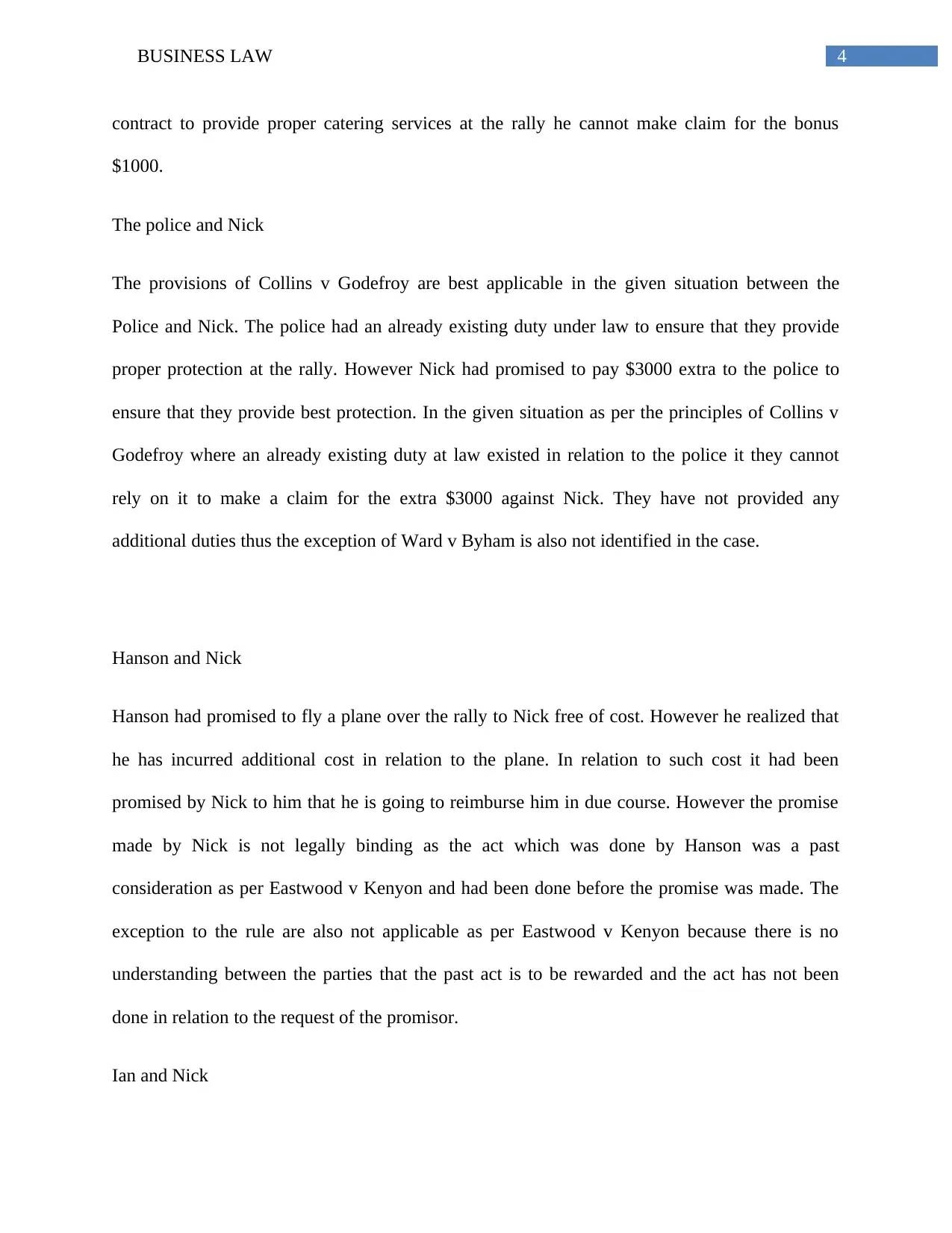
4BUSINESS LAW
contract to provide proper catering services at the rally he cannot make claim for the bonus
$1000.
The police and Nick
The provisions of Collins v Godefroy are best applicable in the given situation between the
Police and Nick. The police had an already existing duty under law to ensure that they provide
proper protection at the rally. However Nick had promised to pay $3000 extra to the police to
ensure that they provide best protection. In the given situation as per the principles of Collins v
Godefroy where an already existing duty at law existed in relation to the police it they cannot
rely on it to make a claim for the extra $3000 against Nick. They have not provided any
additional duties thus the exception of Ward v Byham is also not identified in the case.
Hanson and Nick
Hanson had promised to fly a plane over the rally to Nick free of cost. However he realized that
he has incurred additional cost in relation to the plane. In relation to such cost it had been
promised by Nick to him that he is going to reimburse him in due course. However the promise
made by Nick is not legally binding as the act which was done by Hanson was a past
consideration as per Eastwood v Kenyon and had been done before the promise was made. The
exception to the rule are also not applicable as per Eastwood v Kenyon because there is no
understanding between the parties that the past act is to be rewarded and the act has not been
done in relation to the request of the promisor.
Ian and Nick
contract to provide proper catering services at the rally he cannot make claim for the bonus
$1000.
The police and Nick
The provisions of Collins v Godefroy are best applicable in the given situation between the
Police and Nick. The police had an already existing duty under law to ensure that they provide
proper protection at the rally. However Nick had promised to pay $3000 extra to the police to
ensure that they provide best protection. In the given situation as per the principles of Collins v
Godefroy where an already existing duty at law existed in relation to the police it they cannot
rely on it to make a claim for the extra $3000 against Nick. They have not provided any
additional duties thus the exception of Ward v Byham is also not identified in the case.
Hanson and Nick
Hanson had promised to fly a plane over the rally to Nick free of cost. However he realized that
he has incurred additional cost in relation to the plane. In relation to such cost it had been
promised by Nick to him that he is going to reimburse him in due course. However the promise
made by Nick is not legally binding as the act which was done by Hanson was a past
consideration as per Eastwood v Kenyon and had been done before the promise was made. The
exception to the rule are also not applicable as per Eastwood v Kenyon because there is no
understanding between the parties that the past act is to be rewarded and the act has not been
done in relation to the request of the promisor.
Ian and Nick
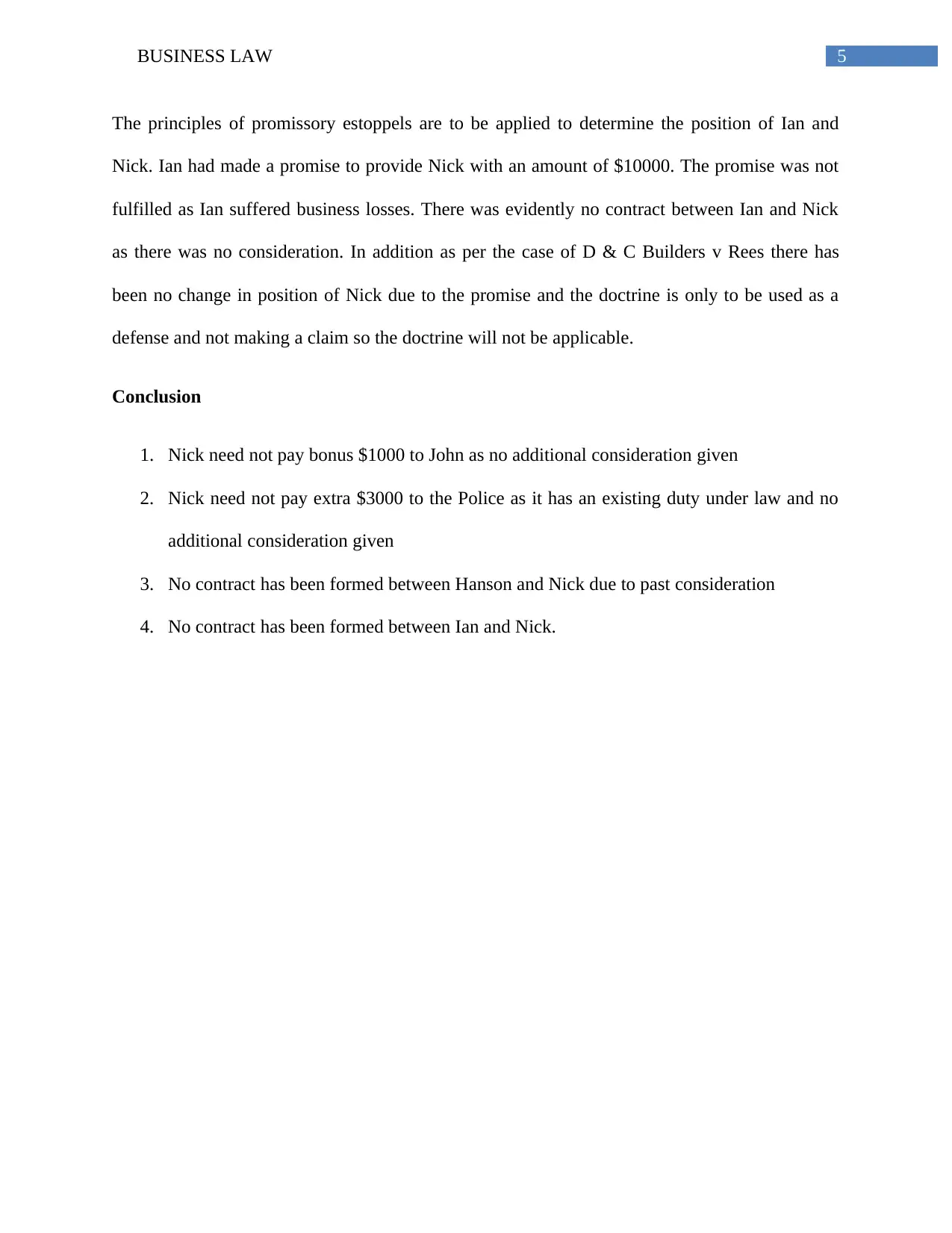
5BUSINESS LAW
The principles of promissory estoppels are to be applied to determine the position of Ian and
Nick. Ian had made a promise to provide Nick with an amount of $10000. The promise was not
fulfilled as Ian suffered business losses. There was evidently no contract between Ian and Nick
as there was no consideration. In addition as per the case of D & C Builders v Rees there has
been no change in position of Nick due to the promise and the doctrine is only to be used as a
defense and not making a claim so the doctrine will not be applicable.
Conclusion
1. Nick need not pay bonus $1000 to John as no additional consideration given
2. Nick need not pay extra $3000 to the Police as it has an existing duty under law and no
additional consideration given
3. No contract has been formed between Hanson and Nick due to past consideration
4. No contract has been formed between Ian and Nick.
The principles of promissory estoppels are to be applied to determine the position of Ian and
Nick. Ian had made a promise to provide Nick with an amount of $10000. The promise was not
fulfilled as Ian suffered business losses. There was evidently no contract between Ian and Nick
as there was no consideration. In addition as per the case of D & C Builders v Rees there has
been no change in position of Nick due to the promise and the doctrine is only to be used as a
defense and not making a claim so the doctrine will not be applicable.
Conclusion
1. Nick need not pay bonus $1000 to John as no additional consideration given
2. Nick need not pay extra $3000 to the Police as it has an existing duty under law and no
additional consideration given
3. No contract has been formed between Hanson and Nick due to past consideration
4. No contract has been formed between Ian and Nick.
⊘ This is a preview!⊘
Do you want full access?
Subscribe today to unlock all pages.

Trusted by 1+ million students worldwide
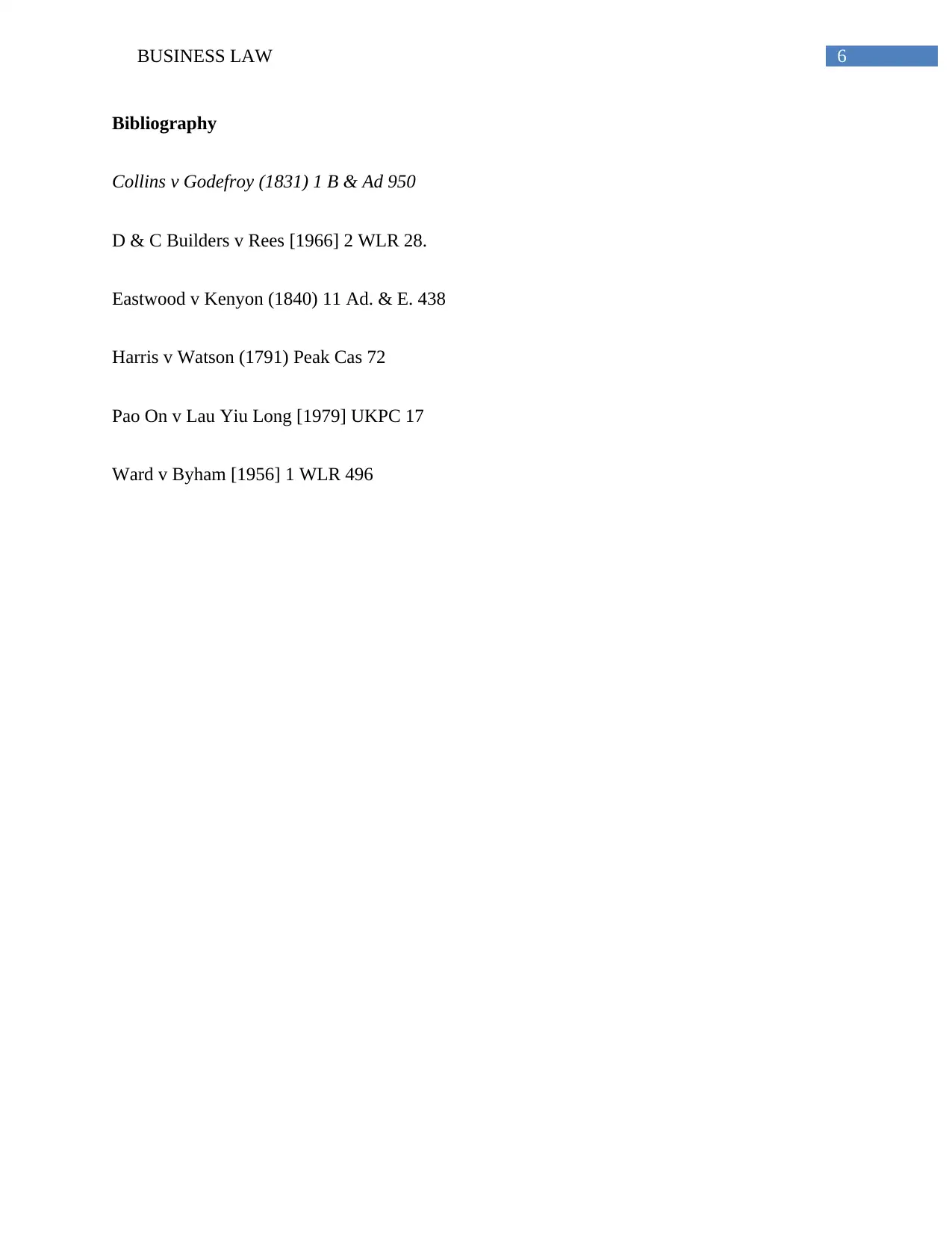
6BUSINESS LAW
Bibliography
Collins v Godefroy (1831) 1 B & Ad 950
D & C Builders v Rees [1966] 2 WLR 28.
Eastwood v Kenyon (1840) 11 Ad. & E. 438
Harris v Watson (1791) Peak Cas 72
Pao On v Lau Yiu Long [1979] UKPC 17
Ward v Byham [1956] 1 WLR 496
Bibliography
Collins v Godefroy (1831) 1 B & Ad 950
D & C Builders v Rees [1966] 2 WLR 28.
Eastwood v Kenyon (1840) 11 Ad. & E. 438
Harris v Watson (1791) Peak Cas 72
Pao On v Lau Yiu Long [1979] UKPC 17
Ward v Byham [1956] 1 WLR 496
1 out of 7
Related Documents
Your All-in-One AI-Powered Toolkit for Academic Success.
+13062052269
info@desklib.com
Available 24*7 on WhatsApp / Email
![[object Object]](/_next/static/media/star-bottom.7253800d.svg)
Unlock your academic potential
Copyright © 2020–2026 A2Z Services. All Rights Reserved. Developed and managed by ZUCOL.




